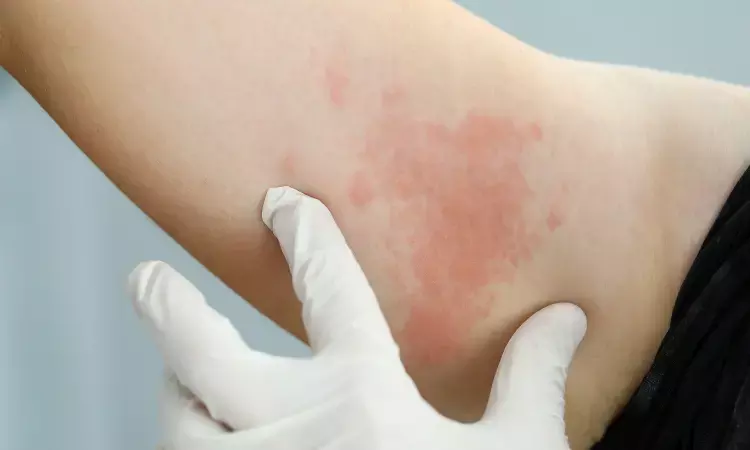- Home
- Medical news & Guidelines
- Anesthesiology
- Cardiology and CTVS
- Critical Care
- Dentistry
- Dermatology
- Diabetes and Endocrinology
- ENT
- Gastroenterology
- Medicine
- Nephrology
- Neurology
- Obstretics-Gynaecology
- Oncology
- Ophthalmology
- Orthopaedics
- Pediatrics-Neonatology
- Psychiatry
- Pulmonology
- Radiology
- Surgery
- Urology
- Laboratory Medicine
- Diet
- Nursing
- Paramedical
- Physiotherapy
- Health news
- Fact Check
- Bone Health Fact Check
- Brain Health Fact Check
- Cancer Related Fact Check
- Child Care Fact Check
- Dental and oral health fact check
- Diabetes and metabolic health fact check
- Diet and Nutrition Fact Check
- Eye and ENT Care Fact Check
- Fitness fact check
- Gut health fact check
- Heart health fact check
- Kidney health fact check
- Medical education fact check
- Men's health fact check
- Respiratory fact check
- Skin and hair care fact check
- Vaccine and Immunization fact check
- Women's health fact check
- AYUSH
- State News
- Andaman and Nicobar Islands
- Andhra Pradesh
- Arunachal Pradesh
- Assam
- Bihar
- Chandigarh
- Chattisgarh
- Dadra and Nagar Haveli
- Daman and Diu
- Delhi
- Goa
- Gujarat
- Haryana
- Himachal Pradesh
- Jammu & Kashmir
- Jharkhand
- Karnataka
- Kerala
- Ladakh
- Lakshadweep
- Madhya Pradesh
- Maharashtra
- Manipur
- Meghalaya
- Mizoram
- Nagaland
- Odisha
- Puducherry
- Punjab
- Rajasthan
- Sikkim
- Tamil Nadu
- Telangana
- Tripura
- Uttar Pradesh
- Uttrakhand
- West Bengal
- Medical Education
- Industry
History of allergic disorders may be associated with increased risk of high BP, CAD

Data from the National Health Interview Survey demonstrated adults with a history of allergic disorders have an increased risk of high blood pressure and coronary heart disease, with the highest risk seen in Black male adults. The study is being presented at ACC Asia 2022 Together with the Korean Society of Cardiology Spring Conference on April 15-16, 2022.
"For patients with allergic disorders, routine evaluation of blood pressure and routine examination for coronary heart disease should be given by clinicians to ensure early treatments are given to those with hypertension or coronary heart disease," said Yang Guo, PhD, Department of Dermatology at the Institute of Dermatology at Peking University Shenzhen Hospital, Shenzhen Peking University-The Hong Kong University of Science and Technology Medical Center, and the study's lead author.
Previous studies reported an association between allergic disorders and cardiovascular disease, which remain controversial findings, Guo said. The current study aimed to determine whether adults with allergic disorders have increased cardiovascular risk.
The study used 2012 data from the National Health Interview Survey (NHIS), which is a cross-sectional survey of the United States population. The allergic group included adults with at least one allergic disorder, including asthma, respiratory allergy, digestive allergy, skin allergy and other allergy. Overall, the study included 34,417 adults, over half of whom were women and averaged 48.5 years old. The allergic group included 10,045 adults. The researchers adjusted for age, sex, race, smoking, alcohol drinking and body mass index; they also examined subgroups stratified by demographic factors.
The researchers found a history of allergic disorders was associated with increased risk of developing high blood pressure and coronary heart disease. In further analyses, individuals with a history of allergic disorders between ages 18 and 57 had a higher risk of high blood pressure. A higher risk of coronary heart disease was seen in study participants who were between ages 39-57, male and Black/African American. Asthma contributed most to the risk of high blood pressure and coronary heart disease.
"Further large cohort studies with long-term follow-up are needed to confirm our findings," Guo said. "Additionally, appreciating the underlying mechanism may help future management in such individuals."
Dr Kamal Kant Kohli-MBBS, DTCD- a chest specialist with more than 30 years of practice and a flair for writing clinical articles, Dr Kamal Kant Kohli joined Medical Dialogues as a Chief Editor of Medical News. Besides writing articles, as an editor, he proofreads and verifies all the medical content published on Medical Dialogues including those coming from journals, studies,medical conferences,guidelines etc. Email: drkohli@medicaldialogues.in. Contact no. 011-43720751


